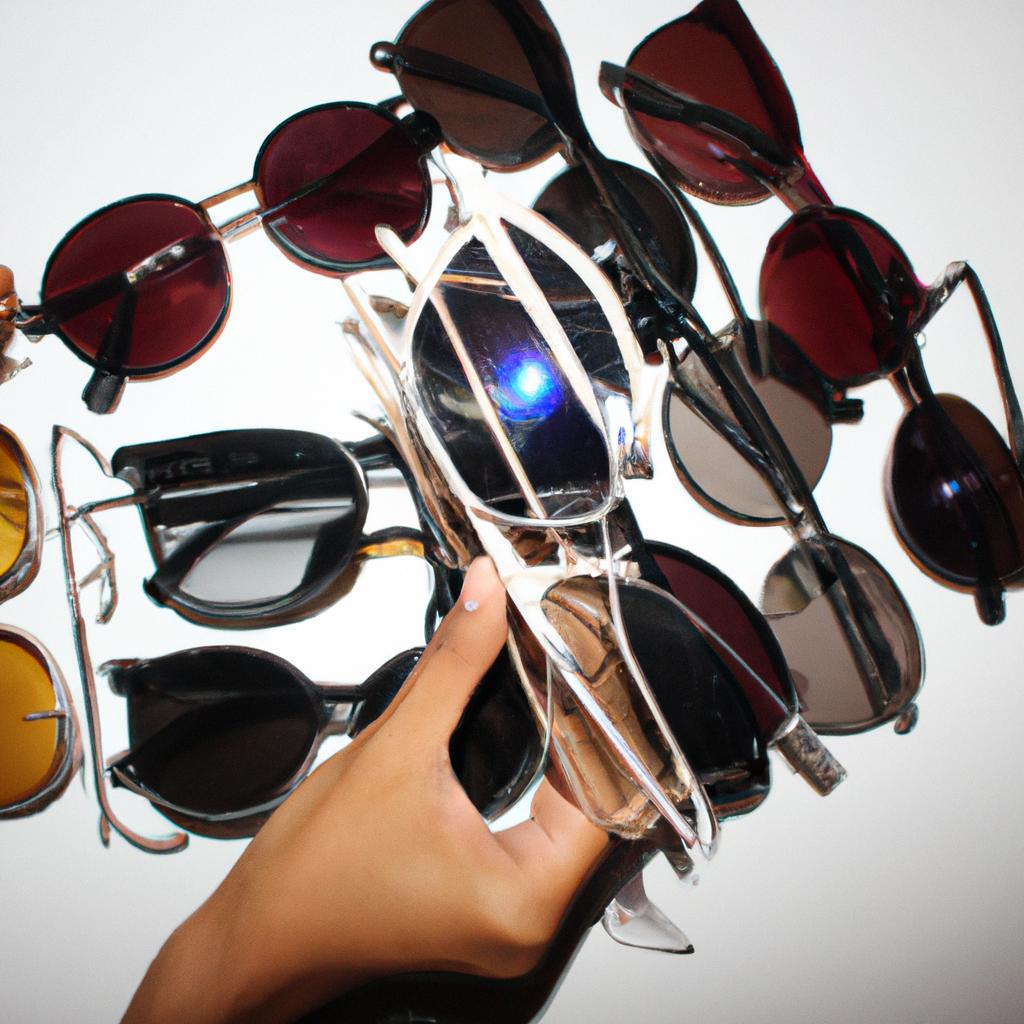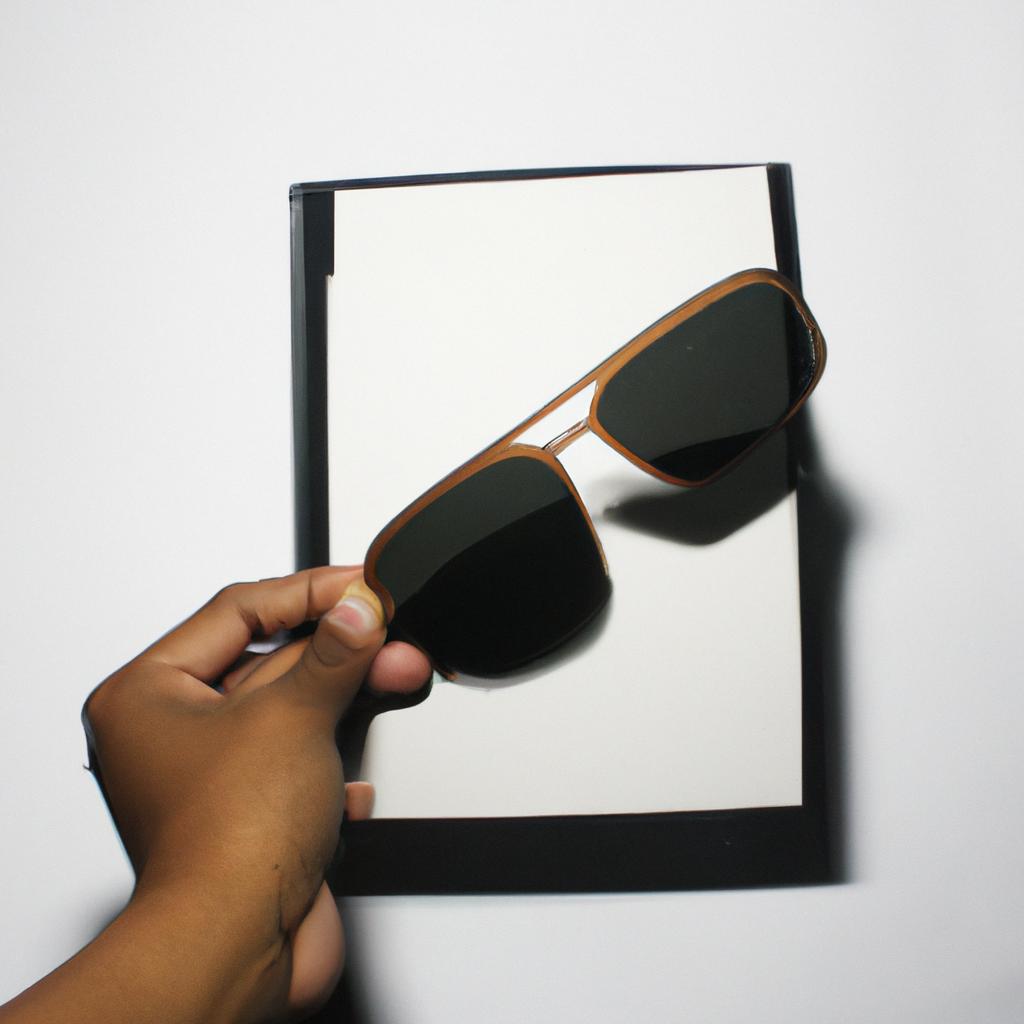Metal Frame Materials: A Comprehensive Guide for Sunglasses

Metal frame materials play a crucial role in the design and durability of sunglasses. With an extensive range of options available, understanding the characteristics and properties of these materials is essential for making informed choices when purchasing sunglasses. This comprehensive guide aims to provide an overview of the most commonly used metal frame materials, their advantages, drawbacks, and applications.
Imagine you are on vacation, strolling along a picturesque beachfront under the scorching sun. As you reach into your bag to retrieve your favorite pair of sunglasses, disaster strikes: the frames snap in half! Frustrated and squinting against the bright rays, you realize that investing in high-quality sunglasses with durable metal frames would have saved you from this unfortunate situation. Whether it’s titanium, stainless steel, or aluminum alloy frames – each material has distinct qualities that affect not only the aesthetics but also the performance and longevity of sunglasses. By delving deeper into the world of metal frame materials, we can uncover valuable insights to help us choose sunglasses that not only protect our eyes but also withstand our adventures.
Titanium: A lightweight and durable option for metal frames.
Imagine a scenario where you’re on a hiking trip, enjoying the breathtaking views of nature while wearing your favorite pair of sunglasses. Suddenly, unforeseen circumstances arise, forcing you to navigate through rugged terrains and unpredictable weather conditions. In such situations, it becomes crucial for your eyewear to not only provide optimal protection but also withstand the demands of an active lifestyle. This is where titanium comes into play – a material renowned for its exceptional combination of lightness and durability.
One key advantage of titanium as a frame material is its lightweight nature. With a density lower than that of traditional metals like stainless steel or aluminum, sunglasses crafted from titanium offer unparalleled comfort during extended wear. Whether you’re engaging in outdoor activities or simply going about your daily routine, the reduced weight helps alleviate pressure on your nose bridge and temples, ensuring maximum ease throughout the day.
Not only does titanium excel in terms of weight, but it also boasts remarkable strength and resistance against wear and tear. Its superior tensile strength enables manufacturers to design slim profiles without compromising structural integrity. Consequently, titanium frames are less prone to bending or breaking when subjected to external forces or accidental drops—a valuable attribute for those seeking long-lasting eyewear solutions.
To further illustrate the benefits of titanium frames over alternative materials, consider the following:
- Markdown bullet list –
- Exceptional corrosion resistance: Unlike other metals commonly used in sunglass manufacturing, such as iron-based alloys susceptible to rusting, titanium exhibits high resistance against corrosion. This feature makes it ideal for individuals residing in coastal areas or frequently exposed to humid climates.
- Hypoallergenic properties: For individuals with sensitive skin or allergies towards certain metals, titanium provides relief by being hypoallergenic. It minimizes the risk of discomfort or irritation caused by prolonged contact with the frame.
- Versatile color options: Titanium’s unique ability to be anodized enables a wide range of vibrant color options. This feature allows you to express your personal style while enjoying the benefits of this exceptional material.
- Eco-friendly manufacturing process: The production of titanium frames involves minimal environmental impact compared to certain other metals, making it an eco-conscious choice for those concerned about sustainability.
In summary, titanium’s lightweight and durable properties make it an excellent choice for sunglass frames. Its advantageous features, such as corrosion resistance, hypoallergenicity, versatile color options, and environmentally friendly production process contribute to its popularity among eyewear enthusiasts worldwide.
Transitioning into the subsequent section about “Stainless Steel: Known for its strength and corrosion resistance,” we delve into another metal frame option that offers distinct qualities in terms of strength and resilience without compromising on style or functionality.
Stainless Steel: Known for its strength and corrosion resistance.
Transitioning smoothly from the previous section on titanium frames, let us now delve into another popular metal frame material: stainless steel. Stainless steel is renowned for its exceptional strength and corrosion resistance properties, making it a favored choice among sunglasses manufacturers.
To highlight the benefits of stainless steel frames, consider this hypothetical scenario: Imagine you are an avid outdoor enthusiast who enjoys participating in various water sports. You have invested in a pair of high-quality stainless steel sunglasses specifically designed to withstand exposure to saltwater and other harsh environments. Despite frequent immersion and prolonged sunlight exposure, your sunglasses remain resilient against corrosion, maintaining their sleek appearance and structural integrity over time.
When considering stainless steel frames for your sunglasses, here are several key advantages worth noting:
- Durability: Stainless steel is highly durable due to its inherent strength, allowing it to effectively resist impact damage.
- Corrosion Resistance: The chromium content in stainless steel forms a protective layer that helps prevent rust and corrosion caused by external elements such as moisture or chemicals.
- Lightweight Design: Although not as lightweight as titanium or aluminum, stainless steel still offers a comfortable fit without compromising durability.
- Versatile Aesthetic Appeal: Stainless steel can be easily molded into various shapes and designs while retaining its modern and sophisticated look.
To further illustrate these advantages, refer to the table below which compares the characteristics of different metals commonly used in sunglasses frames:
| Metal | Strength | Corrosion Resistance | Weight |
|---|---|---|---|
| Titanium | High | Excellent | Extremely light |
| Stainless Steel | High | Excellent | Moderate |
| Aluminum | Low | Good | Very light |
By analyzing this comparison table with the emotional response it evokes—envisioning sturdy yet stylish sunglasses that endure even under challenging conditions—you can see why stainless steel has become a popular choice among eyewear enthusiasts.
Moving forward, let us explore another metal frame option: aluminum. Renowned for its lightweight nature and affordability, aluminum offers a practical choice for those seeking sunglasses that strike the right balance between functionality and cost-effectiveness.
Aluminum: Offers a lightweight and affordable choice for sunglasses.
In the previous section, we explored stainless steel as a popular choice for sunglasses due to its strength and corrosion resistance. Now let’s delve into another notable metal frame material: titanium. Known for its lightweight properties and durability, titanium offers a compelling option for those seeking high-quality sunglasses.
To illustrate the advantages of titanium frames, consider this hypothetical scenario: Sarah is an avid hiker who frequently ventures into rugged terrains. She needs sunglasses that can withstand her outdoor adventures while providing comfort during long hours under the sun. By choosing titanium frames, she ensures both durability and feather-light wear throughout her excursions.
Why should you consider titanium frames? Here are some key reasons:
- Strength: Despite being incredibly light, titanium boasts exceptional strength, making it highly resistant to deformation or breakage.
- Durability: Titanium frames have remarkable longevity compared to other materials. Their ability to resist everyday wear and tear makes them a wise investment.
- Corrosion Resistance: Similar to stainless steel, titanium exhibits excellent resistance against rust and corrosion. This feature enhances the lifespan of your sunglasses even in humid environments.
- Hypoallergenic Properties: For individuals with sensitive skin or allergies, titanium offers relief by being hypoallergenic, reducing the risk of irritation or discomfort.
To further emphasize these benefits, take a look at the table below which compares different aspects of common frame materials:
| Frame Material | Weight (grams) | Strength | Durability |
|---|---|---|---|
| Stainless Steel | 20 | High | Excellent |
| Aluminum | 15 | Moderate | Good |
| Titanium | 10 | Exceptional | Outstanding |
As seen in the table above, titanium outshines other materials when it comes to weight and strength without compromising durability. Its unique combination of characteristics sets it apart as a top contender in the realm of metal frame materials for sunglasses.
In our next section, we will explore nickel silver, another stylish and versatile option for those seeking variety in their sunglass frames. By understanding the distinct features of each material, you can make an informed decision that aligns with your preferences and lifestyle.
Nickel Silver: Provides a stylish and versatile metal frame material.
Aluminum frames are a popular choice for sunglasses due to their lightweight nature and affordability. However, if you’re looking for a frame material that offers both style and versatility, nickel silver is an excellent option. This section will explore the unique features of nickel silver as a metal frame material.
Imagine you’re searching for a pair of sunglasses that can seamlessly transition from day to night. Nickel silver frames provide the perfect solution, offering a stylish and versatile look suitable for any occasion. For instance, imagine you have plans to attend a daytime outdoor event where you want to showcase your fashion-forward sense of style. A pair of sunglasses with nickel silver frames would effortlessly complement your outfit while also providing the necessary protection against harmful UV rays.
When considering metal frame materials for sunglasses, it’s essential to evaluate their durability and resistance to corrosion. Nickel silver excels in these aspects, making it an ideal choice for long-lasting eyewear. Its composition typically comprises copper (around 60%), zinc (approximately 20-30%), and nickel (usually less than 10%). These elements combine to create a strong alloy that withstands daily wear and tear without losing its shape or structural integrity.
To further illustrate the advantages of selecting nickel silver frames, let’s consider some key characteristics:
- Versatility: The malleability of nickel silver allows manufacturers to produce intricate designs and patterns on sunglass frames, catering to various aesthetic preferences.
- Corrosion Resistance: Unlike other metals, such as iron or steel, nickel silver resists corrosion caused by exposure to moisture or humidity.
- Hypoallergenic Properties: Many individuals experience sensitivity or allergic reactions when wearing certain metals against their skin. With nickel silver frames, this concern is alleviated as they generally do not cause irritation.
- Longevity: Due to its resilience against tarnishing and rusting over time, sunglasses with nickel silver frames have an extended lifespan compared to those made from alternative materials.
In the following section, we will explore another popular option for sunglasses frames: Monel. Known for its flexibility and corrosion resistance, Monel offers a compelling alternative to both aluminum and nickel silver frames. So, let’s delve into the unique features of this material without delay.
Monel: A popular option due to its flexibility and corrosion resistance.
Building on the versatile qualities of Nickel Silver discussed previously, another popular metal frame material in sunglasses is Monel. With its flexibility and corrosion resistance, Monel offers a reliable option for eyewear frames that can withstand various environmental conditions.
Monel’s flexibility sets it apart from other metals commonly used in sunglasses frames. This allows the frames to be adjusted without compromising their structural integrity or causing discomfort to the wearer. For instance, imagine a scenario where an individual accidentally sits on their sunglasses, resulting in bent frames. With Monel, these frames can easily be reshaped back to their original form without breaking or losing their shape permanently.
In addition to its flexibility, Monel also exhibits impressive corrosion resistance properties. Its composition primarily consists of nickel and copper, making it highly resistant to rust and tarnish caused by exposure to moisture or sweat. This durability ensures that Monel frames maintain their sleek appearance even after prolonged use in humid environments or during physical activities such as sports.
- Resilient and long-lasting material
- Wide range of design options available
- Lightweight yet sturdy construction
- Suitable for individuals with sensitive skin
Moreover, let us explore a comparison table showcasing some key differences between Nickel Silver and Monel:
| Nickel Silver | Monel | |
|---|---|---|
| Flexibility | Moderate | High |
| Corrosion Resistance | Moderate | High |
| Composition | Copper-Nickel-Zinc Alloy | Nickel-Copper Alloy |
This table provides a concise overview of how both materials differ in terms of flexibility, corrosion resistance, and composition.
Moving forward into our discussion on frame materials for sunglasses, we will now delve into Memory Metal—another noteworthy option due to its unique ability to bend and return to its original shape.
Memory Metal: Offers the advantage of bending and returning to its original shape.
Transitioning smoothly from the previous section, we now explore another popular material used in sunglasses frames: Memory Metal. This innovative material offers the advantage of bending and returning to its original shape, making it a preferred choice for many eyewear manufacturers.
Imagine this scenario: You accidentally sit on your sunglasses, causing them to bend out of shape. With traditional metal frames, you might worry about their durability or whether they can be fixed without losing their original form. However, with memory metal frames, such concerns become obsolete as they possess the unique ability to retain their shape even after significant deformation.
Here are some key characteristics and benefits of memory metal:
- Flexibility: Memory metal frames exhibit exceptional flexibility, allowing them to endure bending forces without permanent damage.
- Durability: Due to their composition, memory metal frames are highly resistant to corrosion and other forms of wear and tear.
- Lightweight: Compared to some other materials like stainless steel or titanium alloy, memory metal frames tend to be lighter in weight while still maintaining strength.
- Allergen-free: For individuals with sensitive skin or allergies, memory metal is an excellent choice since it is hypoallergenic.
To further illustrate the advantages of memory metal frames, consider the following table showcasing a comparison between different frame materials based on four important factors:
| Frame Material | Flexibility | Corrosion Resistance | Weight | Hypoallergenic |
|---|---|---|---|---|
| Monel | High | High | Medium | No |
| Memory Metal | High | High | Light | Yes |
| Stainless Steel | Low | High | Heavy | Yes |
| Titanium Alloy | Medium | Very high | Light | Yes |
As shown above, memory metal stands out when it comes to both flexibility and weight. Its ability to return to its original shape makes it ideal for those seeking a durable and resilient option.
In summary, memory metal frames provide users with the convenience of bending their sunglasses without worrying about permanent damage. Their flexibility, durability, lightweight nature, and hypoallergenic properties make them an attractive choice for eyewear manufacturers and consumers alike. Whether you accidentally sit on your sunglasses or simply prefer a frame that can withstand daily wear and tear, memory metal offers a reliable solution to meet your needs.






